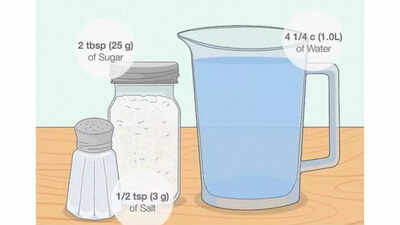ORS for dehydration: Know its benefits for children and adults, how to prepare at home, and potential risks |

Dehydration occurs when the body loses more fluids than it takes in, often due to diarrhoea, vomiting, heat exposure, or excessive sweating. When left untreated, dehydration can become dangerous because water is essential for nearly every bodily function, from temperature regulation to nutrient transport.Oral rehydration therapy (ORT) is a simple yet highly effective treatment designed to replace lost fluids and electrolytes. It involves consuming an oral rehydration solution (ORS), a balanced mixture of water, glucose, and electrolytes such as sodium and potassium. These ingredients work together to restore the body’s hydration levels and maintain proper cell function.
What is an Oral Rehydration Solution (ORS)
An oral rehydration solution (ORS) is a specially formulated drink used to treat and prevent dehydration. It helps restore water and essential salts lost during illness, particularly from diarrhoea or vomiting.Unlike plain water, ORS is designed to enhance fluid absorption in the intestines. It contains precise amounts of glucose (sugar) and electrolytes that help the body rehydrate faster and more efficiently.ORS is commonly recommended by healthcare providers and endorsed by organisations such as the World Health Organisation (WHO) and UNICEF, which have promoted its use since 1975 to prevent dehydration-related deaths worldwide.
How does ORS work for dehydration
Mild dehydration can often be managed by drinking water or clear fluids. However, when dehydration becomes moderate or severe, an ORS is more effective.The science behind ORS lies in how sodium and glucose work together to maximise water absorption in the small intestine. The body uses sodium-glucose cotransporters (SGLTs), special carrier proteins that transport both sodium and glucose across the intestinal wall. This process increases the amount of water absorbed, helping the body regain lost fluids more rapidly.Since its introduction, oral rehydration therapy has saved millions of lives. A study published in The Lancet shows that it has prevented over 54 million deaths due to diarrhoea since 2007 and reduced diarrhoea-related deaths in children by nearly two-thirds since the 1980s.
ORS for children: Is it safe?
ORS is completely safe for children and is often the first-line treatment for diarrhoea-induced dehydration.Children are more vulnerable to dehydration because:
- They have a higher metabolic rate and lose fluids quickly.
- They may not recognise thirst or be able to drink enough fluids on their own.
- Illnesses like diarrhoea, vomiting, or fever can lead to rapid fluid loss.
For these reasons, WHO recommends ORS as a life-saving therapy for children suffering from diarrhoea or other dehydration causes. It’s also suitable for older adults or people with chronic health conditions who are at risk of dehydration.Healthy adults with mild dehydration can usually manage with water, clear soups, or electrolyte-based sports drinks, but ORS is beneficial when symptoms are more severe.
Risks and side effects of Oral Rehydration Therapy
While ORS is generally safe, using it incorrectly can cause electrolyte imbalance, particularly salt toxicity (hypernatraemia), which occurs when sodium levels in the blood become too high.Possible side effects include:
- Nausea or vomiting
- Weakness or fatigue
- Loss of appetite
- Confusion or disorientation
- Intense thirst
- Kidney strain or damage (in rare cases)
People who should use ORS with caution
- Those with kidney disease: The kidneys regulate fluid and salt balance, so excess electrolytes from ORS can strain kidney function or worsen existing problems.
- Individuals with diabetes: ORS contains glucose, which may raise blood sugar levels; diabetic patients should use formulations suitable for their condition.
- Patients with heart failure: Too much sodium from ORS can lead to fluid retention, increasing the risk of swelling and worsening heart symptoms.
- People on heart or blood pressure medications: Certain medicines may interact with the sodium and potassium in ORS, potentially affecting blood pressure control.
If you fall into any of these categories, consult a doctor before using ORS to ensure it’s safe and properly adjusted to your needs.
When to use Oral Rehydration Therapy (ORT)
Oral rehydration therapy should be used under medical guidance, especially for children, older adults, or people with chronic health conditions.You may need ORS if you experience:
- Persistent diarrhoea or vomiting
- Dizziness, fatigue, or dry mouth
- Dark urine or reduced urination
- Rapid heartbeat or confusion
However, drinking ORS unnecessarily can lead to excessive salt intake. If symptoms are mild, try water, diluted juices, or clear broths first. If symptoms persist, contact a healthcare professional to determine if ORS is needed.
How to use Oral Rehydration Solution
ORS comes in liquid or powder form and should be consumed orally. Follow these tips for proper use:
- Sip the solution slowly in small amounts, especially if nausea is present.
- If the person cannot drink due to vomiting, nasogastric feeding (via a tube inserted through the nose into the stomach) may be used under medical supervision.
- Always use clean utensils and water when preparing ORS to prevent contamination.
How to make an Oral Rehydration Solution at home
While commercially prepared ORS packets are safest, a homemade version can be used in emergencies if clean ingredients are available.Steps to prepare ORS at home:
- Wash your hands thoroughly with soap and clean water.
- Clean a container and mixing utensil.
- Pour 1 litre of clean drinking water into the container.
- Add the ORS powder from a pre-measured packet (available at pharmacies).
- Stir well until the powder dissolves completely.
- Avoid improvising with salt and sugar without precise measurements; incorrect ratios can cause further health risks.
Disclaimer: This article is for informational purposes only and should not be considered medical advice. Please consult a healthcare professional before making any changes to your diet, medication, or lifestyle.Also read | Mental health disorders rising among older adults: Understanding the causes, risks, and ways to support healthy ageing





